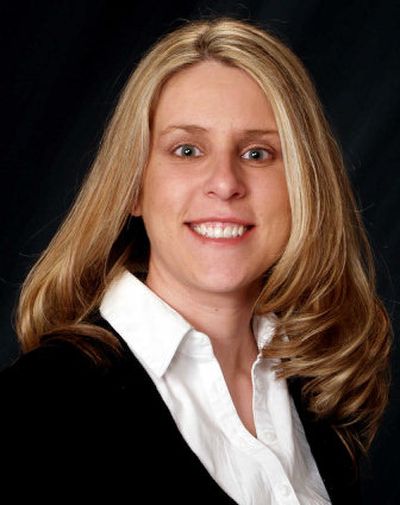Bones physician assistant’s main focus

The next time life tosses you a curveball, think about Jessica Emerson. A faulty ligament in her knee sent her on a new career path.
Spencer Greendyke was the orthopedic surgeon who repaired Emerson’s injured knee 10 years ago in her home state of Iowa. He operated on her mother as well and offered some career counseling for Emerson as a bonus.
She was considering medical school but wanted enough flexibility to start a family. Greendyke suggested a physician assistant program, and Emerson heeded his advice. She received a master’s degree after completing the two-year physician assistant program through Des Moines University School of Osteopathic Medicine in 2005.
Meanwhile, Greendyke returned to his Pacific Northwest roots and opened Rivers Edge Orthopedics in Post Falls. Emerson visited the area soon after graduation, and by that September, she had married, moved west with her husband and accepted Greendyke’s job offer.
Bones were the focus of Emerson’s career long before she concentrated on orthopedics as one of her specialties in the physician assistant program. Prior to that, she had earned a bachelor’s degree in radiology and was a certified X-ray technician.
As a physician assistant, she is licensed to write prescriptions and treat illnesses and injuries under the supervision of a physician.
Emerson’s work includes making rounds with Greendyke as he visits patients at Kootenai Medical Center and Northwest Specialty Hospital. She assists him in surgery and does much of the cast work in their office.
“We have a team approach,” she said.
Emerson’s physician assistant training stressed preventive medicine. With Greendyke’s approval, she began offering osteoporosis screenings rather than waiting to treat consequences of the disease.
“We thought it would be important for the area,” Emerson said. “There are a lot of retired people living here.”
People over age 55 are at greater risk of osteoporosis, the fragile-bone condition that silently can lead to fractures, disability and death.
Patients with porous bones usually show up at Greendyke’s office after a fracture. Discovering that they have osteoporosis sometimes comes as a surprise. For most, the disease progresses painlessly until the eventual break of a spine, hip or wrist bone.
Emerson sees a lot of “fragility fractures,” caused when patients have fallen from a standing height or less. The incidents seem like minor falls but wind up as debilitating injuries. Many patients are eager to know how they can prevent such accidents from recurring.
Emerson hopes that through her screenings, she can catch some patients before they fall. A preliminary bone-density test helps her look for signs of disease. Then she addresses lifestyle, exercise and diet habits and devises a plan to try to keep patients fracture-free.
Emerson stresses weight-bearing activities as well as stretching to maintain flexibility and balance. Some patients need prescription medications, while others may just need education on calcium and vitamin D requirements.
Most people aren’t able to consume adequate amounts through diet alone, Emerson said. For best absorption, intake must be spread throughout the day. And little natural vitamin D is found in sunless winter months.
“It’s usually important to get a supplement,” she said.
Emerson has watched some patients take a year or longer to recover fully from a hip fracture, while others aren’t that fortunate. The National Osteoporosis Foundation says that on average, 24 percent of hip-fracture patients age 50 and over die in the year following a fracture.
One in two women and one in four men over age 50 will suffer an osteoporosis-related fracture. That’s good business for the orthopedics industry, but Emerson wouldn’t mind decreasing those odds.
“If we can prevent someone from having a hip fracture, it can prolong their lifespan by five to 10 years,” she said. “Anytime you can prevent a life-modifying event, it’s always important to educate people and let them become aware.”
To schedule an osteoporosis screening at Rivers Edge Orthopedics, call 777-4360.